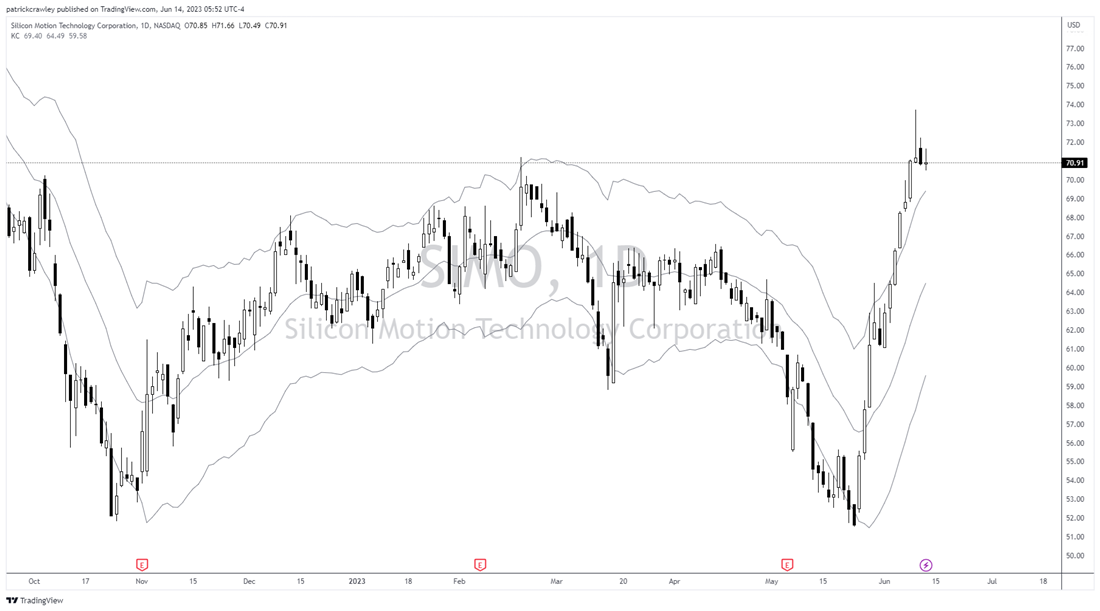![]()
The merger arbitrage opportunity in Silicon Motion (NASDAQ: SIMO) is likely the most attractive in the stock market, offering a 32% spread for a deal that could close before the end of the year.
The US-based communications semiconductor firm MaxLinear (NASDAQ: MXL) offered to buy Taiwan-based Silicon Motion for $3.8 billion in a combined cash/stock deal in May 2022. Silicon Motion is being acquired for about $104.50 per share between the cash and stock consideration.
However, the market has significant doubts about the deal's ability to clear Chinese regulatory approval. China is generally quite sensitive to M&A in the semiconductor industry, especially with the ongoing tech trade war between the US and China. The fact that Silicon Motion is a Taiwanese company domiciled in Hong Kong makes things even more dicey.
But recent reports indicate that China's concerns are more modest than initially thought. And the good news, the opportunity is still juicy.
Details of the Deal
The deal, announced in May 2022, is part of MaxLinear’s aim to expand into new verticals of the semiconductor industry and scale to $2 billion in annual revenue and become a top 10 fabless semiconductor supplier.
MaxLinear offers Silicon Motion shareholders both cash and stock, with a cash consideration of $92.54 per share plus 0.388 shares of MaxLinear for each share of Silicon Motion owned.
Given MaxLinear's current stock price of $30.66, the current value of the stock consideration is $11.89. Add the $92.54 in cash, and you get $104.43 in total consideration. With Silicon Motion currently trading at $70.91, this leaves a deal spread of $33.52, or 32%.
In this context, the deal spread refers to the difference between Silicon Motion’s current share price and the proposed acquisition price.
Why Is The Deal Spread So Wide?
The deal has the go-ahead from all major global regulators except China's State Administration for Market Regulation (SAMR), China's antitrust regulator. Under ordinary circumstances, such a review wouldn't pose a significant risk because MaxLinear and Silicon Motion are in two different verticals of the semiconductor supply chain.
However, China's SAMR has been quite active in scrutinizing semiconductor M&A transactions in recent years. The US and China are embroiled in a semiconductor trade war, with the US restricting chip exports to China and China fighting back with its own measures.
For instance, Intel’s acquisition of Tower Semiconductor (NASDAQ: TSEM) has been under SAMR review for over a year. At the same time, SAMR has imposed conditions on other deals like the AMD/Xilinx deal.
MaxLinear is a US-based company, and Silicon Motion is based in Taiwan and domiciled in Hong Kong. The deal would take one of the largest players in the NAND flash controller market out of China's control and into the grasp of a US company.
Thus far, the market has been quite pessimistic on the prospects of the deal closing, explaining the massive spread between Silicon Motion's share price and the acquisition price.
While the risk of this deal falling apart due to SAMR blocking would explain a high spread, the current spread doesn't make much sense in context. The spread in the Intel/Tower Semiconductor deal is just 24% while being of much higher strategic importance to the Chinese than this deal.
However, recent reports from SeekingAlpha indicate that MaxLinear and Silicon Motion are starting to make progress in its SAMR dealings, as the Chinese don’t view NAND flash controllers as significantly important strategically.
The deal spread has narrowed significantly over the last few weeks as positive SAMR news has hit the tape.

Still, the deal spread is wide, presenting risk and opportunity. Of course, traders that are bullish on this deal's prospects will see significant returns, but markets are relatively efficient. The widespread indicates that many are still uncertain if this deal will go through.













